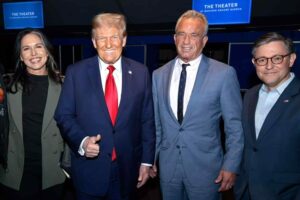DATA POINTS
- 3.9 years – The average job tenure of the American worker
- 10% – The percentage of federal workers who work fully remote
- 20% – The percentage egg prices are expected to increase this year due to the bird flu
- 90 days – The number of days nearly all foreign aid will be frozen for by the US State Department
- 4.06 M – The number of existing-home sales in the U.S. last year, the lowest since 1995.
- 9 B – The number of trips taken in China for the Lunar New Year – the world’s biggest annual movement of humanity
 The Trump Recap
The Trump Recap
Few have had as busy of a week of President Trump’s pen during his first week in office. He signed 35 executive orders during his first seven days (31 more than his first administration and more than any of the last 15 presidents). While his first term’s starting orders could have been deemed posturing pieces, this week’s events were substance. They covered a wide range of issues, including preventing federal money from funding or promoting elective abortion through Medicaid, establishing a council to review FEMA, providing water resources to California, loosening restrictions on government use of AI, and establishing the President’s Council of Advisors on Science and Technology, among others.
The White House made headlines this week confirming that both Canada and Mexico will receive 25% tariffs on exports to the U.S., and China will be hit with a 10% hike on current tariff levels. Canada and Mexico have announced that they are prepared to respond to the action with tariffs of their own, sparking concern over a potential trade war with the U.S.’ largest trading partners.
President Trump is effectively implementing lessons learned from his first four years in office. For a President, time is the most valuable resource – and he is wasting none of it. He’s also presenting a new level of sophistication and internal order in his second term in office.
Read More at the Associated Press
Health: The RFK Way
Robert F. Kennedy, Jr., seeking the prestigious role as Trump’s Secretary of Health and Human Services, faced off against Senators across the aisle during his confirmation hearing on Wednesday. He’s known for his devout skepticism and peculiar commentary on health issues, medicine, and science. The Senate panel tried to decipher whether the outspoken nominee’s opinions on vaccines, food, healthcare, well-being, and abortion were disqualifying.
While known as the scion of a legendary Democratic politician, RFK, Jr. does not carry the subtlety that Congress or many Americans, are accustomed to seeing from a cabinet leader. He affirmed to the hearing room that he is not anti-vaccine or anti-industry (claims that he’s been fighting since running for president). In his words, “I am neither; I am pro-safety. I worked for years to raise awareness about the mercury and toxic chemicals in fish, but that didn’t make me anti-fish. All of my kids are vaccinated, and I believe vaccines have a critical role in health care.”
Republicans applauded his work, while Democrats sought to determine if his commentary on vaccine efficacy, abortion, Medicare, and Medicaid fell in line with his true political beliefs. Often, they claimed he is unfit entirely to hold the position. His years of public skepticism regarding food, medicine, disease, and healthcare haunted him during the hearing. Democrats pressed him on whether he believes Lyme disease is an engineered bioweapon, whether he will restrict abortion rights, and how we will address potential Republican-led reform of Medicaid.
RFK has a tightrope to walk if he is to secure the position, as he can only afford to lose support from three Republican Senators if Democrats unanimously vote against his confirmation.
CDC, KDHE vs. TB in KCa
Kansas is currently facing its largest tuberculosis (TB) outbreak in decades, marking the most significant bout in the U.S. since the 1950s. The majority of cases have been concentrated in Wyandotte County, which includes part of Kansas City, where 60 active TB cases have been reported. In total, 67 active cases and 79 latent cases have been confirmed across the state. Two deaths have been linked to the outbreak as of last year.
Kansas health officials, including the Kansas Department of Health and Environment (KDHE), are collaborating with the Centers for Disease Control and Prevention (CDC) to manage and curb the outbreak. While they’ve reassured the public that the risk to most people remains low, they’re keeping a close eye on the situation. According to KDHE, the health department is actively reaching out to those who may have been exposed and offering free treatment to anyone who doesn’t have insurance or whose insurance doesn’t cover the cost.
TB spreads through the air when an infected person coughs, speaks, or sings, which is why it’s important for people to recognize symptoms like a persistent cough, fever, weight loss, and fatigue. However, not everyone who tests positive for TB is contagious. Many individuals have latent TB, where the bacteria are present but not causing illness. Without treatment, latent TB can become active.
Retail Fails, Tucks Tail, and Downscales
Retail is experiencing its worst performance since the beginning of the COVID-19 pandemic. In total, 7,325 retail stores across the country closed in 2024, and 1,925 have already shut down in 2025. For reference, nearly 10,000 closed during the beginning of the pandemic. The trend is only expected to continue; another 15,000 stores are projected to close by the end of the year.
Amazon, Costco, and Walmart are the only outliers, and each has expanded its territory as consumers increasingly prefer value and convenience. Small chains and specialty retailers cannot keep up with the big stores that have everything in one location. There’s no denying that the pandemic changed how consumers, employees, and companies interact with the economy. And, once the cat is out of the bag, it’s difficult to get it back in. With nearly everything being either online or in Walmart, niche stores are struggling to keep their doors open.
Countdown?
Queue the Iron Maiden. Atomic scientists moved the minute hand on the “Doomsday Clock” a tad bit closer to midnight – the closest it’s ever been. “Midnight,” as it were, is the theoretical point of human annihilation. Happy Friday, everyone! The Russian offensive in Ukraine and its accompanying nuclear threat, the Israel-Gaza crisis and other wars in the Middle East, Chinese military action to claim Taiwan, military and other concerning applications of artificial intelligence, and accelerating climate change repercussions are to blame for the encroachment. In total, there are more than 45 ongoing armed conflicts around the world.
The Bulletin of Atomic Scientists, who invented and time-keep the clock, said the United States, China, and Russia have the largest ability and responsibility to keep the world from pushing over the brink.
For those who may experience some existential dread, remember this: when you worry, you suffer twice. Focus on things you can control, like treating your neighbors with love and respect and creating a more wholesome community for others. The world can be a scary place, but our neighborhoods don’t need to be.
Be sure to follow us on Facebook, Twitter, and LinkedIn for more news and industry updates. To receive a copy of The Weekender in your inbox, sign up here.










